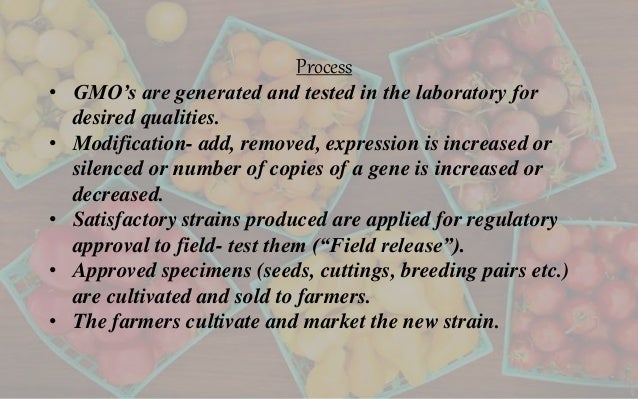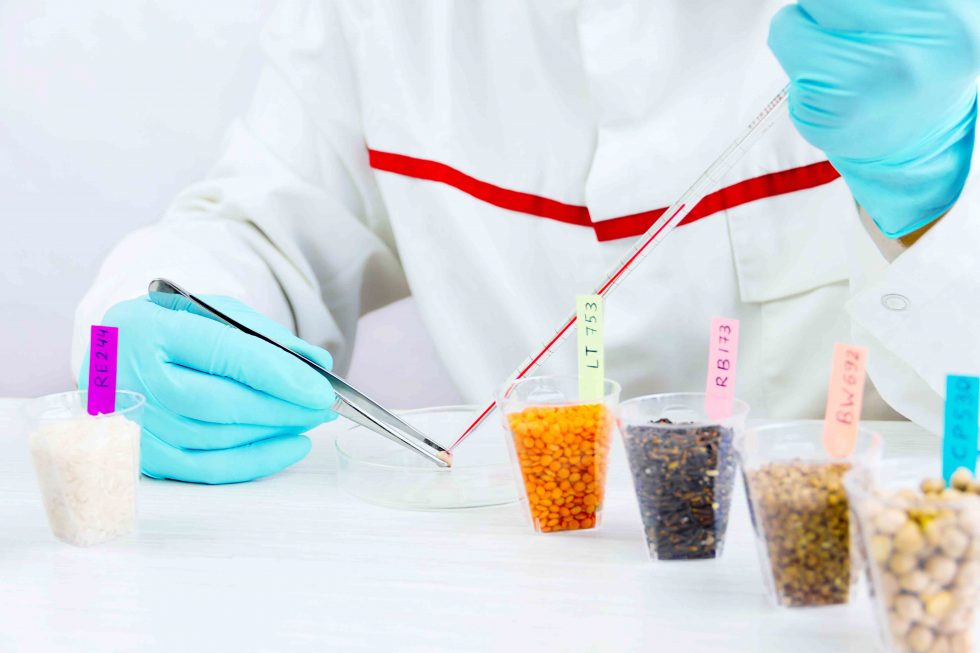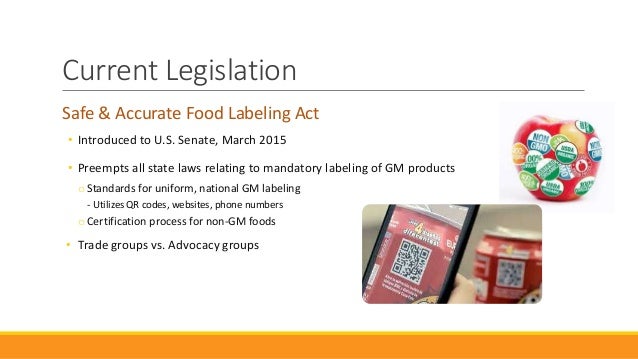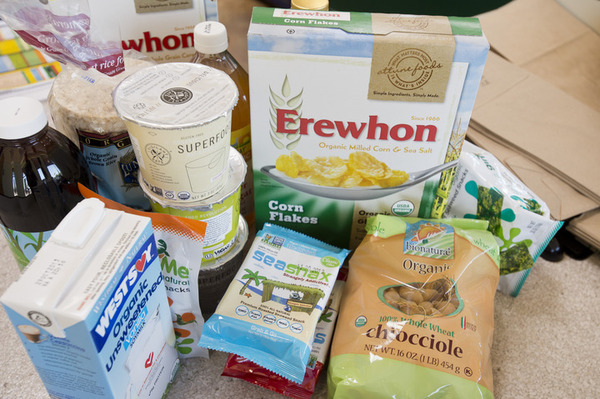38 genetic engineering on food labels
Mandatory labels can improve attitudes toward genetically engineered food The prospect of state and federal laws mandating labeling of genetically engineered (GE) food has prompted vigorous debate about the consequences of the policy on consumer attitudes toward these technologies. There has been substantial debate over whether mandated labels might increase or decrease consumer aversion toward genetic engineering. What the New 'Bioengineered' Food Label Means | Food & Wine However, for the purposes of the standard, the foods that require labeling are determined by the USDA's official List of Bioengineered Foods. Currently, the list contains 13 items: Alfalfa Apples...
Understanding GMOs and Bioengineered Foods - Navigating food labels in ... Non-GMO labels are not regulated. Non-GMO labels are just tools used for marketing Bioengineered food labels are regulated by the USDA. There are only 11 bioengineered items available at the store. Bioengineered Items: Alfalfa, Apples, Canola, Corn, Cotton, Potatoes, Rainbow Papaya, Salmon, Soybean, Squash, Sugar Beets Bioengineered food labels

Genetic engineering on food labels
About GMO Foods | Just Label It "Genetically Engineered Foods", "Genetically modified organisms," or GMOs, are organisms that have been created through application of transgenic, gene-splicing techniques that are part of biotechnology. These transgenic methods for moving genes around are also called "genetic engineering," or GE. GMO Labeling | Science of GMOs Foods and food products that are certified as organic by USDA's National Organic Program meet a set of standards that prohibits all use of GE technology in organic food production and processing, so the USDA Organic label indicates that foods do not contain GMO ingredients. Genetic Engineering Has No Place In "Natural" Foods - Just Label It Genetic Engineering Has No Place In "Natural" Foods By: Libby Foley (EWG) and Tina Sigurdson (Stabile Law) Supermarket shelves are loaded with products that display the label "natural." The food industry likes to use the word to persuade consumers that what they're buying is somehow better for them, their families and the environment.
Genetic engineering on food labels. 2.3 Understanding Food Labels - FON135 Sustainable Cooking Lab Manual Other Food Labels . Genetically Modified Organisms (GMOs) 4. GMO's refer to plants, seeds, or animals that have had DNA, or genetic material, modified by genetic engineering. The FDA, USDA, and EPA (Environmental Protection Agency) regulate most GMO products to ensure their safety. Organic standards do not allow for the use of GMOs. Label Genetically Engineered Food - Organic Consumers Association Poll after poll during the past decade showed that nine out of 10 Americans agree that food with genetically engineered ingredients should say so on the label. Almost 1 million Californians signed a petition to get labeling of genetically engineered food on this November's ballot. They want the right to know what is in their foods. PDF Labeling of Genetically Modified Foods - Extension A current application of this type of procedure is the analysis and labeling of vitamin content of foods. • Process-based verification entails detailed record-keeping of seed source, field location, harvest, transport, and storage. This is similar to the type of 'identity preservation' system used to certify shade-grown coffee or organic foods. A Q & A on the Mandatory Labeling of Genetically Engineered Foods Genetic engineering is just one method that humans can use to change the genetic makeup of food. Since the 1990s, genetically engineered food has been in the U.S. food supply.
Genetically modified food - Wikipedia Definition. Genetically modified foods are foods produced from organisms that have had changes introduced into their DNA using the methods of genetic engineering as opposed to traditional cross breeding. In the U.S., the Department of Agriculture (USDA) and the Food and Drug Administration (FDA) favor the use of the term genetic engineering over genetic modification as being more precise; the ... Why Labels on Genetically Engineered Foods Won't Cost Consumers a Dime For related articles and more information, please visit OCA's Genetic Engineering page and our Millions Against Monsanto page. The biotech industry, led by Monsanto, will soon descend on the state of Washington to try their best to defeat I-522, a citizens' ballot initiative to require mandatory labeling of foods that contain genetically engineered (GE) ingredients. What's behind a 'genetically engineered' label? | Nature Biotechnology the expense associated with ge labeling is primarily a function of two cost elements: first, the productivity-driven difference between the costs of production in ge and non-ge production systems... The signaling effect of mandatory labels on genetically engineered food ... A mandatory label might cause firms to eschew GE ingredients, switch to non-GE ingredients, and drive up costs in the process (Alston and Sumner, 2012, Carter et al., 2012). The example of the European Union seems to support the argument that companies will substitute away from GE food if labels are mandatory (Carter et al., 2012).
Labeling of Genetically Modified Foods - 9.371 - Extension Mandatory labeling of genetically modified (GM) foods has been proposed under a variety of initiatives at national and state levels but has not yet been implemented in the United States. Current U.S. law mandates food labeling when there is a substantial difference in the nutritional or safety characteristics of a new food. The USDA's new labeling for genetically modified ... - Washington Post The USDA's new labeling for genetically modified foods goes into effect Jan. 1. Here's what you need to know. The agency has done away with familiar terms like 'GMOs' and has built in loopholes for... Completely meaningless 'partially produced with genetic engineering ... GMO Labels Won't Make Your Food Safer Soon you will see the words "partially produced with genetic engineering" in the fine print on many food packages. Activist groups have spent millions of dollars fighting for that tiny text, and food companies have spent millions fighting back. And none of that effort had anything to do with your health. GMO is out, 'bioengineered' is in, as new U.S. food labeling ... - NPR Starting this month, alert consumers may have noticed labels on some foods that say "bioengineered" or "derived from bioengineering," per new federal standards. Ted S. Warren/AP. Say goodbye to ...
How consumers use mandatory genetic engineering (GE) labels: evidence ... Food labels legislated by the U.S. government have been designed to provide information to consumers. It has been asserted that the simple disclosures "produced using genetic engineering" on newly legislated U.S. food labels will send a signal that influences individual preferences rather than providing information. Vermont is the only US state to have experienced mandatory labeling of ...
What Are GMOs and Genetic Engineering in Agriculture? - FoodPrint Genetically engineered (GE) or genetically modified (GM) foods are produced from plants and animals that have had changes made to their DNA, which introduce or modify genetic traits. Most packaged foods contain genetically modified organisms (GMOs) engineered to be resistant to herbicides and pests; corn, soybeans and canola oil are prime examples.
Guidance: Voluntary Labeling Food from Genetically Engineered Plants Because section 201 (f) (1) of the FD&C Act defines "food" in relevant part as "articles used for food or drink for man or other animals," the food derived from genetically engineered plants...
Viewpoint: Mandatory gene-edited food labels would ease consumer fear ... "Frankenfoods" was one well-used label to describe GMOs and reflects how misunderstood the technology was. The biotechnology sector never bothered connecting with the public as it was promoting its...
With bioengineered food labels showing up in stores, here's what you ... It is posted under Fair Use guidelines. While "genetic engineering" is the term typically used by scientists, you will start seeing the "bioengineered" label on some of the GMO foods we eat in the...
What the Bioengineering Food Disclosure Law Means for Marketers The BE Food Label is the next new packaging requirement to hit the food industry - requiring food companies to disclose if their foods are or may be bioengineered. This label is mandatory (unlike the non-GMO label ). While this label came to be in early 2020, full compliance must be reached in 2022.
GMO, GE, Bioengineered...What Do All These Food Labels Mean? - VPR However, the U.S. Senate Agriculture committee's GMO labeling bill does not use the term GE for its label and instead the bill defines "bioengineered food." (Some critics of the bill say its authors did this because of the stigma associated with GE.) The bill's definition of "bioengineered food" leaves a lot open to interpretation.
Biotechnology and the Food Label - Oxford Scholarship 3 Biotechnology and the Food Label; 4 European Community Legislation for Traceability and Labeling of Genetically Modifi ed Crops, Food, and Feed; 5 Genetically Engineered Animals and the Ethics of Food Labeling; 6 Mandatory Genetic Engineering Labels and Consumer Autonomy; 7 Consumer Response to Mandated Labeling of Genetically Modified Foods
Genetically Engineered Foods Should NOT Bear Special Labels Genetically Engineered Foods Should NOT Bear Special Labels January 2, 2000 Since life began, genes have crossed the boundaries of related and unrelated species in nature. Biotechnology applications by humans date back to 1800 B.C., when people began using yeast to leaven bread and ferment wine.
USDA Genetic Engineered Food Label Misleads Consumers, Took Effect ... (Beyond Pesticides. January 7, 2022) Unbeknownst to most Americans when they woke up on New Year's Day 2022, a new labeling system for genetically modified-engineered foods— promulgated in 2019 — which does not mention genetically engineered or GMO ingredients, went into effect. Consumer, food, and environmental advocates say that the new label is misleading, insufficiently transparent ...
Genetic Engineering Has No Place In "Natural" Foods - Just Label It Genetic Engineering Has No Place In "Natural" Foods By: Libby Foley (EWG) and Tina Sigurdson (Stabile Law) Supermarket shelves are loaded with products that display the label "natural." The food industry likes to use the word to persuade consumers that what they're buying is somehow better for them, their families and the environment.
GMO Labeling | Science of GMOs Foods and food products that are certified as organic by USDA's National Organic Program meet a set of standards that prohibits all use of GE technology in organic food production and processing, so the USDA Organic label indicates that foods do not contain GMO ingredients.
About GMO Foods | Just Label It "Genetically Engineered Foods", "Genetically modified organisms," or GMOs, are organisms that have been created through application of transgenic, gene-splicing techniques that are part of biotechnology. These transgenic methods for moving genes around are also called "genetic engineering," or GE.














Post a Comment for "38 genetic engineering on food labels"